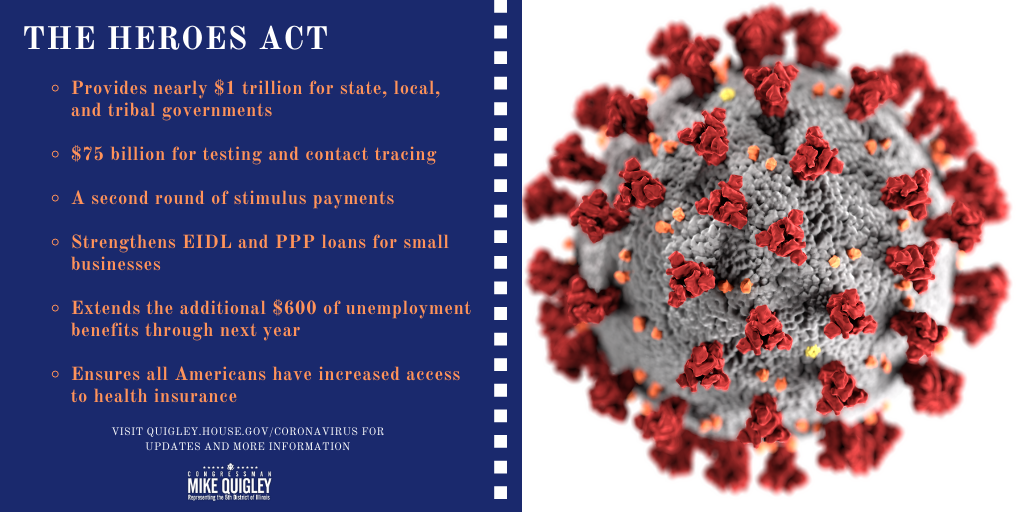Next Steps: House Democrats' Plan for Fighting Coronavirus

As of this week, over 1.5 million Americans have contracted coronavirus and over 90,000 have died – including more than 4,100 here in Illinois. And last month, nearly 22 million Americans filed for unemployment. I know that essential workers can't wait for support and families can't wait to pay rent or to keep food on their tables. I was proud that Congress mobilized quickly to pass three pieces of smart, bipartisan legislation but the crisis hasn't ended, and Congress can't consider our work done either.
If families can't wait, then House Democrats don't believe that Congress has time to waste either.
That's why last week, I returned to Washington, D.C., where House Democrats passed the Heroes Act, our latest piece of legislation to support state, local, and tribal governments in the fight against coronavirus and to provide American families with the assistance they need.
Heroes Act
On Friday, May 15, 2020, House Democrats passed legislation that would provide states and local governments with critical funding to backfill devastating revenue shortfalls and support our front line workers in the fight against coronavirus. That includes $2.1 billion for CDC to support state, local, and tribal health departments. We know that we will not be able to fully revitalize our economy until we have this health care crisis under control so the Heroes Act includes $75 billion for testing, tracing, and treatment and it ensures all Americans have increased access to health insurance.

House Democrats also know that economic hardship didn't end after the last stimulus package. While we may have provided some much-needed relief, a single $1,200 check is not sufficient. The Heroes Act would provide a second round of direct economic assistance and would extend the additional $600 of unemployment benefits through next year so Americans out of work have a vital safety net to fall back on. We have also voted to continue our support for our small businesses by strengthening EIDL and PPP loans for small businesses.
As the Chair of the Appropriations Subcommittee on Financial Services and General Government, I fought for, and am proud that the Heroes Act included almost $1 trillion in funding to support states in their fight against coronavirus, of which $18.55 billion would go to Illinois. As a long-time champion of election security, I published an op-ed last month with Appropriations Committee Chair Nita Lowey where we called for an increase in funding to protect our elections during this pandemic. Our advocacy helped lead the way for the $3.6 billion for grants to States for contingency planning and $25 billion for the United States Postal Service to help preparation for the upcoming election.
Unfortunately, Senate Majority Leader Mitch McConnell has said that he feels "no urgency" when it comes to passing our next coronavirus response bill. As health and economic conditions across the country continue to worsen, it is my hope that Senate Republicans reconsider their position and quickly take up and pass the Heroes Act. Lives quite literally depend on what the federal government does next.
This pandemic isn't over and we will be dealing with the economic fallout for months, if not years to come. As long as we are asking essential workers to keep showing up to work and asking Americans to stay home and forego paychecks, Congress has an obligation to keep passing legislation to help them.
Legislating During Coronavirus
House Democrats also took steps last week to ensure that Congress can continue to fully operate despite the ongoing pandemic. Like many of you, Congress has been forced to find new ways to get our work done remotely and today's vote would ensure that we are able to represent our constituents fully while protecting the safety of staff, administrators, and members of Congress, and without ourselves spreading the virus. These rules changes will enable Congress to govern as normally as possible during these extraordinary times.
Through passing H. Res. 965, the House will temporarily institute proxy voting and allow virtual committee proceedings during the coronavirus pandemic. Proxy voting will mean that Members who have underlying conditions that put them at high risk or who have to travel a long distance to Washington, D.C., which would expose them to greater risk, do not have to make the trip. Instead, those of us who are lucky enough to be relatively young and healthy can cast votes at their direction. Remote committee hearings and semi-remote committee markups will also ensure that voters' voices are heard at every step of legislating, despite the pandemic.
You can continue to contact me or my staff through my website at quigley.house.gov/contact or by phone at (202) 225-4061 or (773) 267-5926.
For the latest information from the Centers for Disease Control and Prevention please visit cdc.gov/coronavirus.
For the latest information from the Illinois Department of Public Health, please visit dph.illinois.gov/coronavirus.
Sincerely,
Mike Quigley